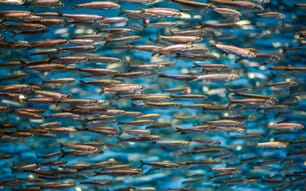Labelling rules have also been overhauled, to improve information for consumers. The new legislation should allow for more sustainable fishing and take effect on time, at the start of 2014.
"The reform will tackle the biggest problem of the Common Fisheries Policy, which is continued overfishing. The Council of the EU will now be obliged to act in a sustainable way when negotiating fishing quotas,” said rapporteur Ulrike Rodust (S&D, DE).
Fishermen will have to respect the "maximum sustainable yield" (MSY), i.e. catch no more than a given stock can reproduce in a given year. The aim is to restore and maintain fish stocks above levels that can produce the MSY.
Banning discards
Discards - fish thrown back, usually because they are of an unwanted species or size - account for almost a quarter of total EU catches. Most of the discarded species die.
To end this wasteful practice, which is currently not forbidden, fishing vessels will have to land at least 95 per cent of all catches in accordance with a schedule of specific dates for different fisheries, starting gradually from 2015. The European Parliament has fought and managed to keep this figure as high as possible, just short of a total ban.
Landed catches of fish that are undersized, for example, would be restricted to uses other than human consumption.
A comprehensive reform
The reform overhauls many CFP rules. For example, the sustainability principle will henceforth apply to EU vessels fishing outside EU waters, so EU fishermen will be able to take only surplus fish from third countries' territorial waters. Furthermore, member states with oversized fleets may be penalised by withholding EU fisheries fund subsidies.
In addition, new marketing rules will ensure that consumers are better informed about the fish they buy, inter alia by requiring that labels give more details of the catch area or the type of gear used.
Commissioner Damanaki stated on the vote on the CFP reform: “The vote by the European Parliament means that we now have a policy which will radically change our fisheries and will pave the way for a sustainable future for our fishermen and our resources. I am very grateful to both Parliament and Council for their commitment, vision and overall support for the Commission's proposals which mean we can now return to sustainable fishing in the short term and put an end to wasteful practices. The new CFP is a driver for what is most needed in today's Europe: a return to growth and jobs for our coastal communities."
The vote means that the CFP reform has been officially adopted and will now be applied throughout European Union waters as of 1 January 2014.


